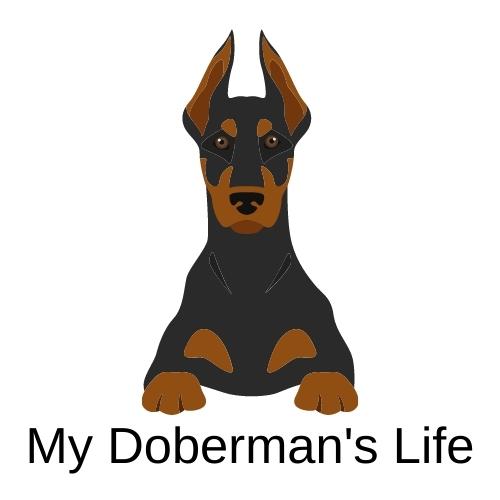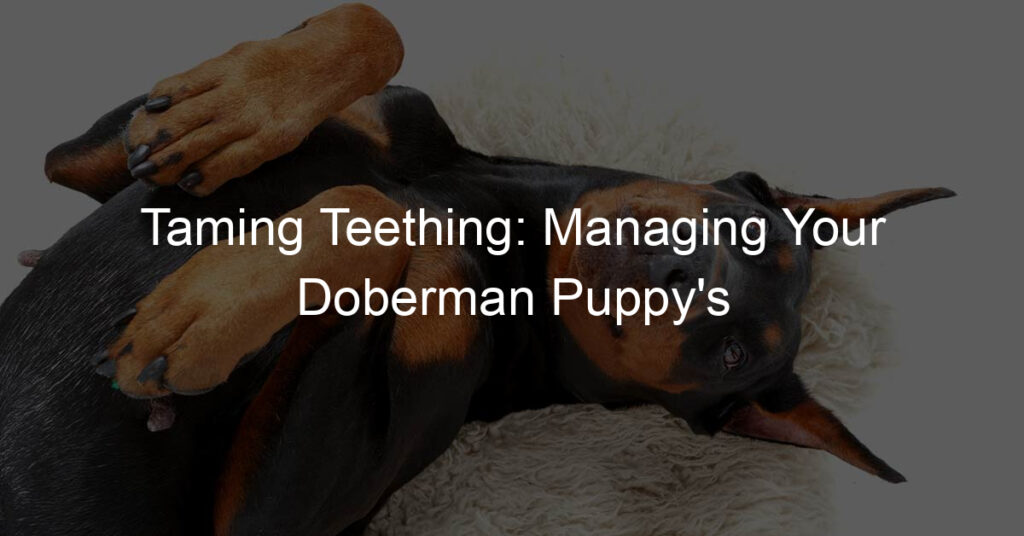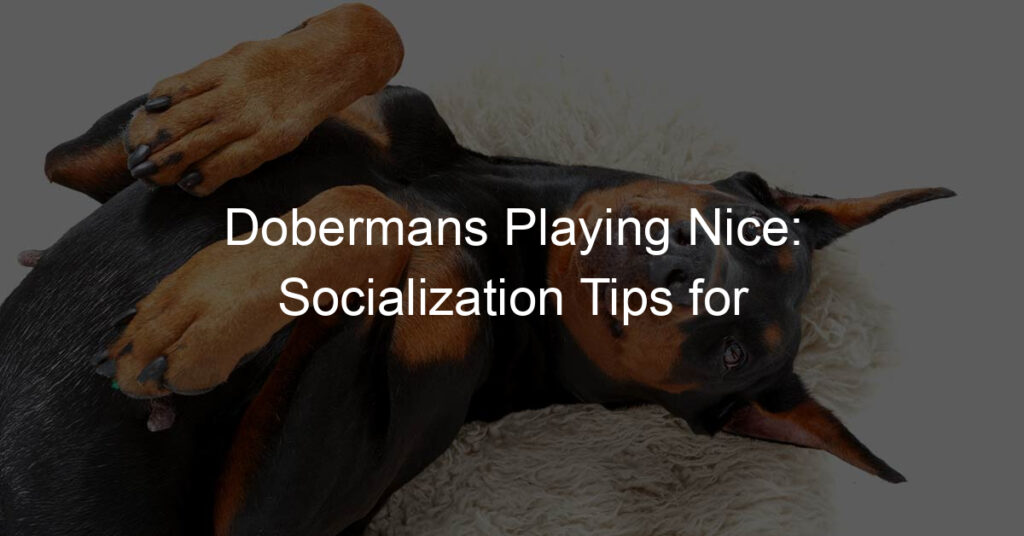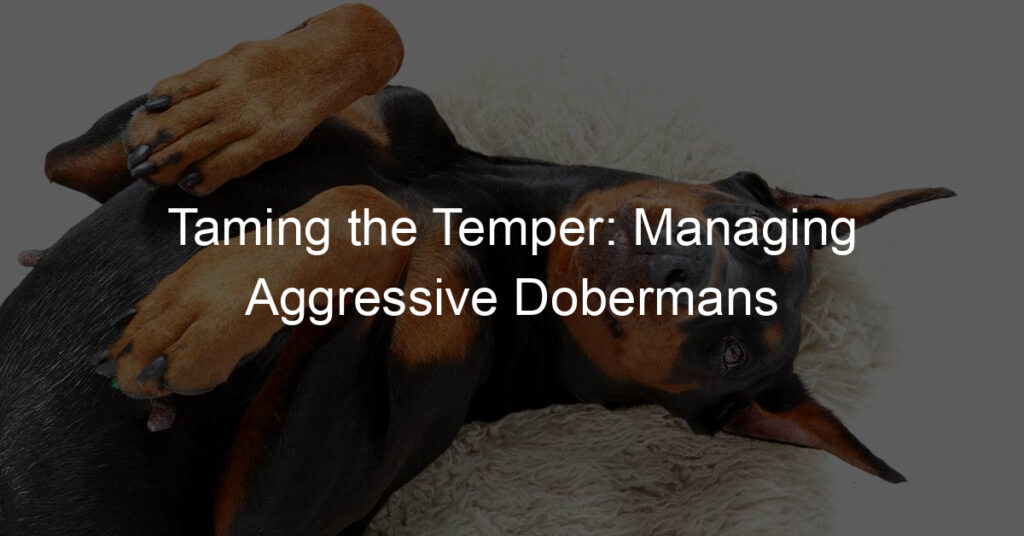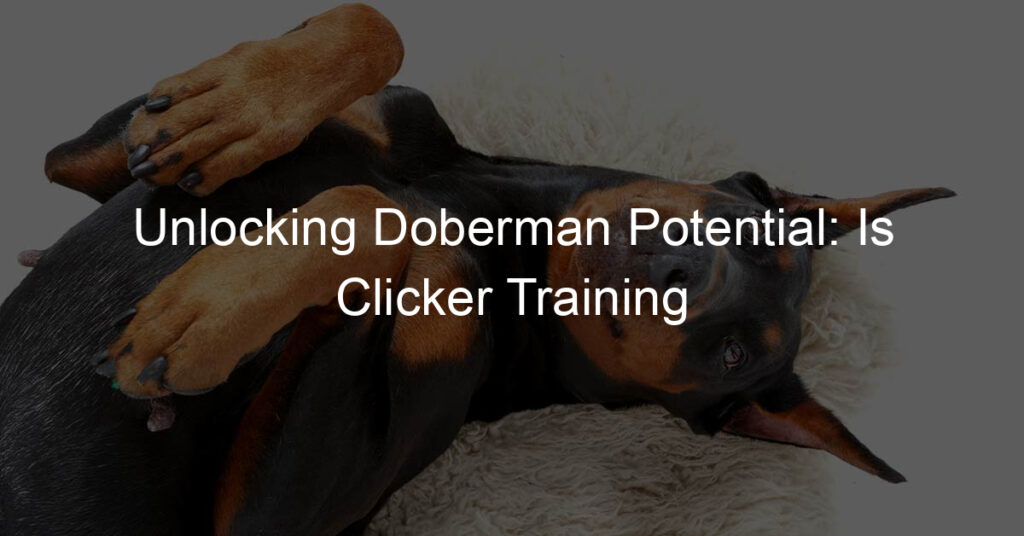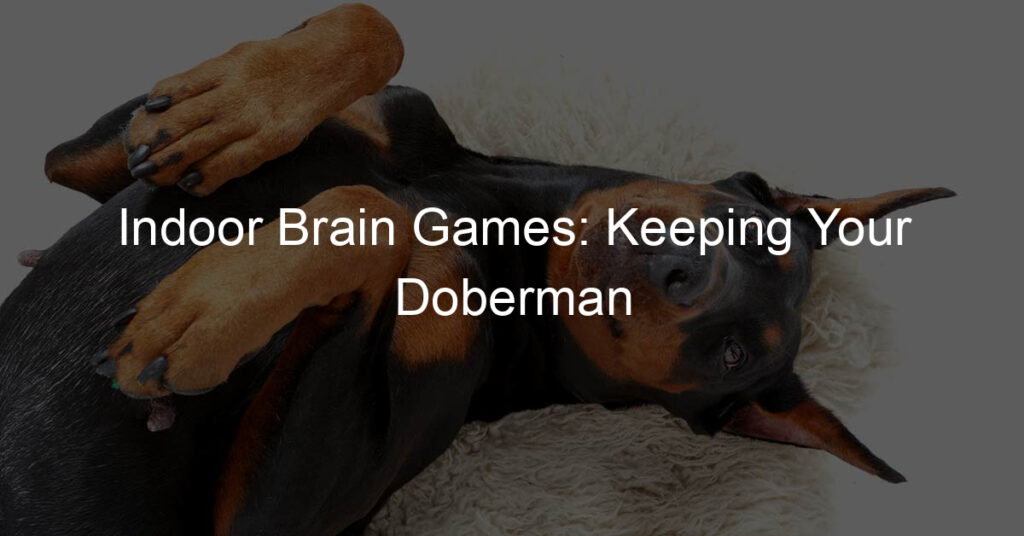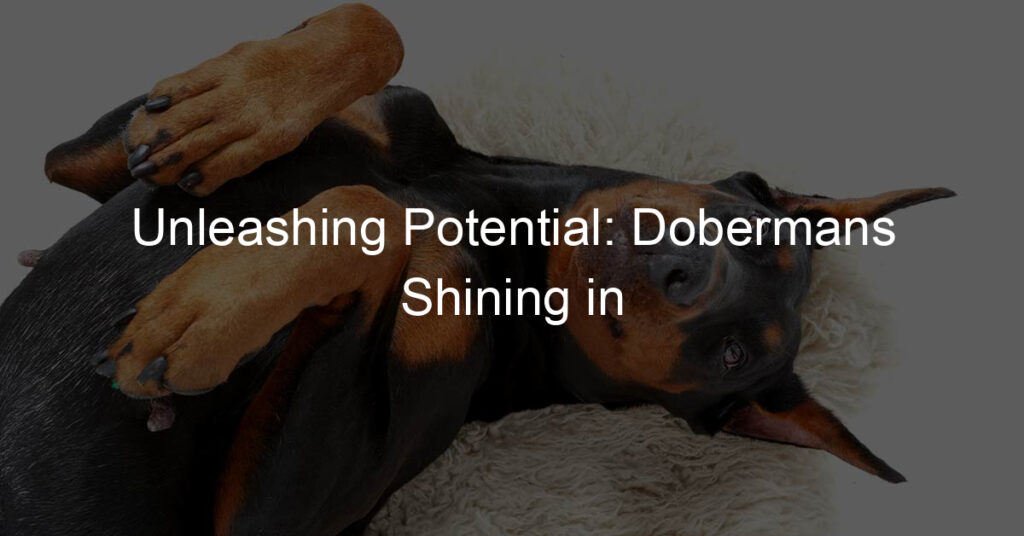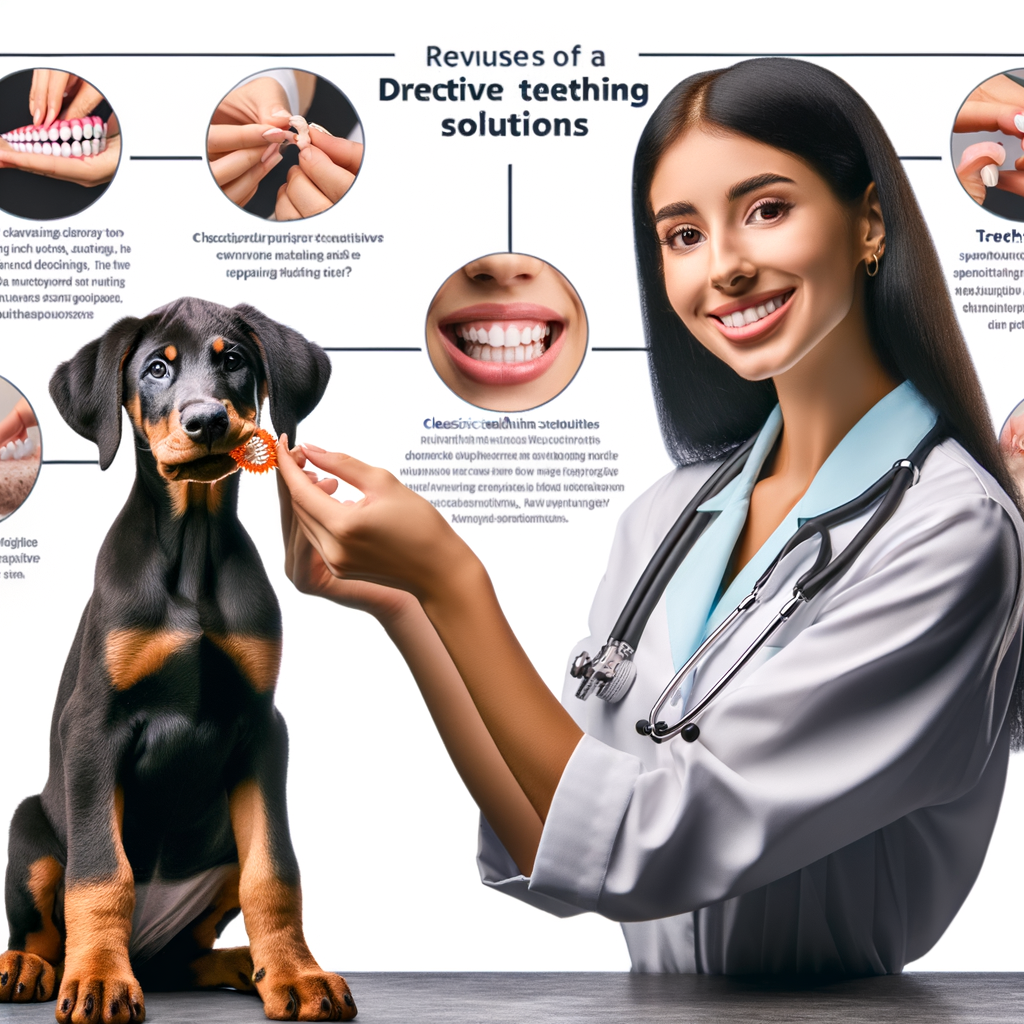
Introduction to Doberman Puppy Teething
Teething is a natural part of a Doberman puppy’s growth and development. It’s a process that can be both exciting and challenging for new pet owners. In this section, we will delve into the intricacies of the Doberman puppy teething process and how to recognize its signs. This knowledge will help you better understand your puppy’s needs and ensure their overall well-being.
- Understanding the Doberman Puppy Teething Process
- Recognizing the Signs of Teething in Your Doberman Puppy
Doberman puppies, like all dogs, are born without teeth. Their baby teeth, also known as deciduous teeth, start to emerge when they are about 3 to 4 weeks old. By the time they’re 8 weeks old, most puppies have a full set of 28 baby teeth. These are not meant to last forever. Around 3 to 6 months of age, these baby teeth will start to fall out, making way for the 42 adult teeth that Dobermans have. This process can cause discomfort for your puppy, leading to increased chewing and drooling.
Recognizing the signs of teething can help you provide the necessary comfort and care for your Doberman puppy. Some common signs of teething include excessive chewing on toys, furniture, and even your hands. You might also notice increased drooling, a decrease in appetite, and potential changes in behavior such as irritability or restlessness. Some puppies may even have slightly swollen gums or bad breath. It’s important to remember that these signs are temporary and should subside once your puppy’s adult teeth have fully emerged.
In the following sections, we will discuss how to manage your Doberman puppy’s chewing habits, what to expect during the teething stages, and training tips beyond teething. By understanding and addressing your puppy’s teething process, you can ensure a happy and healthy Doberman puppy.
Managing Puppy Chewing: An Essential Part of Doberman Puppy Care
Chewing is a natural behavior for all puppies, including Dobermans. It’s an essential part of their development and learning process. However, managing this behavior is crucial to ensure the safety of your puppy and the longevity of your belongings. Let’s delve into why Doberman puppies chew and how you can manage it effectively.
Why Doberman Puppies Chew
Understanding why your Doberman puppy chews can help you manage this behavior better. There are two main reasons:
- Teething and the Need to Chew
- Exploring the World Through Chewing
Just like human babies, puppies go through a teething phase. This usually starts when they are about 4 months old and can last until they are 7 months old. During this time, their baby teeth fall out, and their adult teeth start to grow in. This process can be uncomfortable and even painful for your puppy. Chewing helps to relieve this discomfort.
Puppies are curious creatures. They use their mouths to explore their surroundings and learn about the world. Chewing is a way for them to investigate different textures, tastes, and smells. It’s a crucial part of their learning and development.
Understanding these reasons can help you empathize with your puppy and manage their chewing in a positive and effective way. Remember, it’s not about stopping your puppy from chewing entirely, but rather directing their chewing towards appropriate items.
Chewing Problems in Doberman Puppies
Chewing is a natural behavior for Doberman puppies, but it can sometimes lead to problems. There are two main issues that pet owners should be aware of: excessive chewing and chewing on inappropriate items.
- Excessive Chewing and Potential Risks
- Chewing on Inappropriate Items
Excessive chewing is when your Doberman puppy chews more than what is considered normal. This can lead to potential risks such as damaging their teeth or choking on small objects. According to a study by the American Veterinary Dental Society, excessive chewing can lead to dental issues in 80% of dogs by the age of three.
Excessive chewing can also be a sign of other health issues. For example, it can indicate that your puppy is suffering from anxiety or stress. It’s important to monitor your puppy’s chewing habits and consult with a vet if you notice any changes.
Chewing on inappropriate items is another common problem in Doberman puppies. This includes things like shoes, furniture, and even electrical cords. Not only can this cause damage to your belongings, but it can also pose a serious risk to your puppy’s health.
According to the Pet Poison Helpline, chewing on electrical cords can lead to burns in the mouth, difficulty breathing, and even cardiac arrest. Ingesting pieces of furniture or shoes can also lead to intestinal blockages, which can be life-threatening if not treated promptly.
As a Doberman puppy owner, it’s crucial to manage your puppy’s chewing habits. This includes providing appropriate chew toys, puppy-proofing your home, and monitoring their behavior. With the right care and attention, you can ensure that your Doberman puppy grows up to be a happy and healthy dog.
Teething Solutions for Puppies: How to Manage Your Doberman’s Chewing Habits
Teething is a natural part of a Doberman puppy’s growth, but it can lead to destructive chewing habits if not managed properly. Here, we will discuss how to train your Doberman puppy to chew appropriately and redirect their chewing to the right items.
Training Doberman Puppies to Chew Appropriately
Training your Doberman puppy to chew appropriately is crucial. It not only saves your furniture and shoes from destruction but also ensures the safety of your puppy. Let’s explore two effective strategies for this training.
- Establishing Chewing Rules
- Redirecting Chewing to Appropriate Items
Setting clear and consistent rules is the first step in training your puppy. Make sure your puppy understands what is off-limits. For instance, you can use a firm ‘no’ when they start chewing on inappropriate items. Remember, consistency is key. If you allow your puppy to chew on a shoe once, they might think it’s always okay.
Once you’ve established the rules, it’s time to redirect your puppy’s chewing to appropriate items. Provide them with a variety of chew toys. When they start chewing on something they shouldn’t, redirect them to their toys. Praise them when they chew on their toys to reinforce the behavior. This method not only satisfies their teething urges but also keeps them entertained and mentally stimulated.
In conclusion, managing your Doberman’s chewing habits during their teething phase is a vital part of their training. By establishing clear chewing rules and redirecting their chewing to appropriate items, you can ensure a happy and healthy puppyhood for your Doberman.
Teething Toys for Doberman Puppies
When it comes to managing your Doberman puppy’s teething habits, the right toys can make a world of difference. Not only do they provide a safe outlet for your puppy’s natural urge to chew, but they also help to soothe the discomfort associated with teething. Here, we’ll explore how to choose the right teething toys and how to introduce them to your puppy.
- Choosing the Right Teething Toys
- Introducing Teething Toys to Your Puppy
Selecting the right teething toys for your Doberman puppy is crucial. A good teething toy should be durable, safe, and appealing to your puppy. It should be made of non-toxic materials and be tough enough to withstand your puppy’s strong jaws. Avoid toys with small parts that could be swallowed or choked on. Some popular choices include rubber chew toys, rope toys, and frozen teething toys which can help soothe sore gums.
Introducing teething toys to your Doberman puppy should be a gradual process. Start by letting your puppy explore the toy under your supervision. You can encourage your puppy to chew on the toy by making it more appealing. This can be done by smearing a small amount of peanut butter or wet dog food on it. Remember, the goal is to redirect your puppy’s chewing habits towards the toy and away from inappropriate items like shoes or furniture.
Teething is a natural part of your Doberman puppy’s growth and development. With the right teething toys and a little patience, you can help your puppy navigate this stage with ease. Remember, every puppy is unique, so what works for one may not work for another. Don’t be afraid to try different toys until you find the ones that your puppy loves the most.
Puppy Teething Stages: What to Expect with Your Doberman
Understanding the teething stages of your Doberman puppy is crucial to ensuring their oral health and comfort. Let’s delve into what you can expect during the early teething stage.
Early Teething Stage
The early teething stage in Doberman puppies typically starts around three weeks of age and lasts until about six weeks. This period is characterized by two main events:
- First Teeth Appearance
- Initial Chewing Behaviors
During this stage, your Doberman puppy will start to grow their first set of teeth, known as deciduous or ‘baby’ teeth. You might notice tiny, sharp teeth poking through their gums. Don’t be alarmed – this is a natural part of their development. By the time your Doberman puppy is about six weeks old, they should have a full set of 28 baby teeth.
As these new teeth start to appear, your Doberman puppy will begin to exhibit initial chewing behaviors. This is their way of exploring the world around them and relieving the discomfort associated with teething. You might notice your puppy chewing on toys, furniture, or even your fingers. It’s essential to provide safe and appropriate chew toys during this stage to protect your belongings and promote healthy chewing habits.
Remember, every Doberman puppy is unique and may not follow these stages exactly. Always consult with your vet if you have concerns about your puppy’s teething process.
Later Teething Stages
As your Doberman puppy grows, it will experience two significant stages in its teething process. These stages are critical to the development of your puppy’s dental health. Let’s delve into these stages and understand what they entail.
- Loss of Puppy Teeth
- Emergence of Adult Teeth
Typically, around the age of 4 to 6 months, your Doberman puppy will start losing its baby teeth. This is a natural process and a sign that your puppy is maturing. You may notice small teeth around your home or in your puppy’s toys. Don’t be alarmed; this is perfectly normal.
During this stage, your puppy’s gums may be a bit sensitive. It’s crucial to provide them with soft chew toys to ease their discomfort. Remember, patience is key during this stage as your puppy may become a bit more chew-happy than usual.
Following the loss of their baby teeth, your Doberman puppy will begin to grow its adult teeth. This usually happens between the ages of 6 to 8 months. You’ll notice larger, sharper teeth replacing the smaller ones your puppy lost.
It’s essential to monitor this stage closely. Ensure all baby teeth have fallen out and that the adult teeth are growing in correctly. If you notice any issues, such as a baby tooth not falling out or an adult tooth growing in crooked, it’s best to consult your vet.
Understanding these later teething stages can help you better care for your Doberman puppy. Remember, every puppy is unique and may not follow these stages exactly. Always keep an eye on your puppy’s dental health and consult your vet if you have any concerns.
Doberman Puppy Training Tips: Beyond Teething
Training your Doberman puppy goes beyond managing their teething stage. It involves establishing good behavior that will last a lifetime. Let’s delve into some key aspects of this training.
Establishing Good Behavior
Good behavior in a Doberman puppy is not a result of chance. It requires consistent training and positive reinforcement. Let’s explore these two important aspects.
- Importance of Consistency in Training
- Positive Reinforcement Techniques
Consistency is the backbone of any successful training program. For your Doberman puppy, it means sticking to the same rules and routines every day. This consistency helps your puppy understand what is expected of them, reducing confusion and promoting good behavior.
For instance, if you’re teaching your puppy not to jump on people, everyone in the household must enforce this rule. If one person allows the puppy to jump while others don’t, it will confuse the puppy and make training more difficult.
Positive reinforcement is a powerful tool in dog training. It involves rewarding your puppy for good behavior, encouraging them to repeat it. The reward can be a treat, praise, or a favorite toy.
For example, when your Doberman puppy sits on command, immediately reward them with a treat and praise. This will make them associate sitting on command with positive outcomes, encouraging them to do it more often.
Remember, the key to successful positive reinforcement is timing. The reward must be given immediately after the desired behavior for the puppy to make the connection.
Establishing good behavior in your Doberman puppy requires patience and consistency. But with the right techniques, you can shape your puppy into a well-behaved and obedient companion.
Addressing Common Doberman Puppy Behavior Issues
Training a Doberman puppy goes beyond just managing their teething habits. It also involves addressing common behavior issues that may arise. In this section, we will focus on two prevalent issues: separation anxiety and aggression.
- Dealing with Separation Anxiety
Separation anxiety is a common issue among Doberman puppies. It is a state of distress that your puppy may experience when left alone or separated from their family members. This can manifest in various ways such as excessive barking, destructive behavior, or attempts to escape.
Addressing separation anxiety involves creating a safe and comfortable environment for your puppy. Start by leaving your puppy alone for short periods and gradually increase the duration. Reward your puppy for calm behavior when you’re about to leave and upon your return. This will help them associate your departures and arrivals with positive experiences.
- Managing Aggression in Doberman Puppies
Aggression in Doberman puppies can be a serious concern if not addressed early. It can manifest as growling, biting, or aggressive play. It’s important to remember that aggression is often a response to fear, frustration, or a perceived threat.
Managing aggression involves identifying the triggers and redirecting the behavior. Use positive reinforcement techniques to reward good behavior and discourage aggression. Socialization with other dogs and people is also crucial in helping your Doberman puppy learn appropriate behavior.
Remember, patience and consistency are key when dealing with these behavior issues. If problems persist, consider seeking help from a professional dog trainer or behaviorist.
Conclusion: Ensuring a Happy, Healthy Doberman Puppy
As we wrap up this comprehensive guide on Doberman puppy care, let’s revisit some of the key points we’ve discussed and share some final thoughts.
- Recap of Managing Puppy Chewing
- Final Thoughts on Doberman Puppy Care
Managing your Doberman puppy’s chewing habits is a crucial part of their care. Remember, teething is a natural process that all puppies go through. It’s essential to provide them with safe and appropriate chew toys to soothe their gums and keep them entertained. Regular training and positive reinforcement can also help manage their chewing habits.
Doberman puppies are energetic, intelligent, and require a lot of care and attention. From managing their teething and chewing habits to training them, every step is crucial in ensuring they grow into happy, healthy adults. Remember, patience and consistency are key. With the right care and training, your Doberman puppy will become a loyal and loving member of your family.
In conclusion, raising a Doberman puppy is a rewarding experience. They are not just pets, but companions who will bring joy and happiness into your life. So, ensure you provide them with the best care possible, and they will reward you with their loyalty and love.
| Key Takeaways |
|---|
| Teething is a natural process for puppies, provide them with safe chew toys. |
| Training and positive reinforcement are crucial in managing chewing habits. |
| Doberman puppies require a lot of care and attention. |
| Patience and consistency are key in puppy care and training. |
